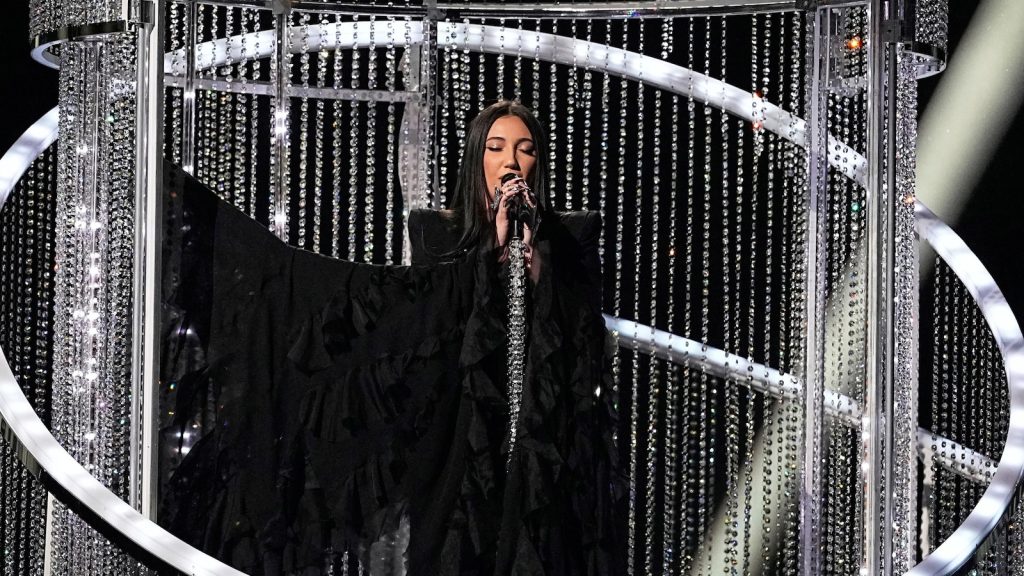BASEL, Switzerland — There has already been triumph and tears, singing onstage and in the streets, and a touch of political division, as the 69th Eurovision Song Contest approaches its grand final in the Swiss city of Basel.
Musical acts from 26 countries will take the stage at the St. Jakobshalle arena on Saturday in a spectacular, sequin-drenched competition that has been uniting and dividing Europeans since 1956.
Here’s everything to know:
Eurovision is competition in which performers from countries across Europe, and a few beyond it, compete under their national flags with the aim of being crowned continental champion. Think of it as the Olympics of pop music or the World Cup with singing instead of soccer.
It’s a celebration of silly fun and music’s unifying power, but also a place where politics and regional rivalries play out.
“It’s Europe’s biggest cultural event,” said Dean Vuletic, an expert on the history of Eurovision. “It has been going on for almost 70 years and people love to watch it, not only for the show, for the glitter, the stage effects, the crazy costumes, but also because they like to see it as a reflection of the zeitgeist in Europe.”
Of 37 countries that sent performers to Eurovision, 11 were knocked out by public voting in semifinals on Tuesday and Thursday. Another six automatically qualified for the final: the host, Switzerland, and the “Big Five” that pay the most to the contest — France, Germany, Italy, Spain and the U.K.
The 26 countries competing Saturday, in order of performance, are: Norway, Luxembourg, Estonia, Israel, Lithuania, Spain, Ukraine, the U.K, Austria, Iceland, Latvia, the Netherlands, Finland, Italy, Poland, Germany, Greece, Armenia, Switzerland, Malta, Portugal, Denmark, Sweden, France, San Marino and Albania.
Favorites, according to oddsmakers, are KAJ, representing Sweden with “Bara Bada Bastu,” a jaunty serenade to the sauna. Dutch singer Claude is also highly rated with soulful ballad “C’est La Vie.” Other favorites include classically trained Austrian countertenor JJ with his pop-opera song “Wasted Love,” and Israel’s Yuval Raphael, with her anthemic “New Day Will Rise.”
Eurovision has a reputation for campy europop with nonsense lyrics — past winners include “La, La, La” and “Boom Bang-a-Bang.” But It has also produced some enduring pop classics. And it helped make stars of performers including ABBA — winners in 1974 with “Waterloo” — Celine Dion, Austrian drag performer Conchita Wurst and Italian rock band Måneskin.
This year’s finalists range from Lithuanian emo rockers Katarsis to a power ballad Spanish diva Melody and Ukrainian prog rockers Ziferblat.
Campiness, humor and double entendres abound. “Espresso Macchiato” is a comic ode to Italian stereotypes performed by Estonia’s Tommy Cash. Miriana Conte sings for Malta with the double entendre-filled “Serving” — performed on a set including a glitter ball and giant lips, it is classic Eurovision.
It was once widely accepted that the most successful Eurovision songs were in English, but that is changing. This year’s contest features songs in a record 20 languages, including Ukrainian, Icelandic, Latvian, Maltese and Armenian.
Vuletic said viewers these days want “more authenticity in Eurovision entries.
“They don’t just want a standard pop song sung in English,” he said. “They want to also see something about the culture of the country that the song represents.”
Once all the acts have performed in the final, the winner is chosen by a famously complex mix of phone and online voters from around the world and rankings by music-industry juries in each of the Eurovision countries. As the results are announced, countries slide up and down the rankings and tensions build.
Ending up with “nul points,” or zero, is considered a national humiliation.
The final starts Saturday at 1900 GMT (3 p.m. EDT) and will be aired by national broadcasters in participating nations, on streaming service Peacock in the United States and in many countries on the Eurovision YouTube channel.
During and immediately after the final, viewers in participating countries can vote by phone, text message or the Eurovision app — but not for their own country. Viewers in the U.S. and other nonparticipating countries can vote all day Saturday, online at www.esc.vote or with the app. The combined “rest of the world” vote is given the weight of one individual country.
The contest’s motto is “united by music,” but the world’s divisions inevitably intrude.
Russia was banned from Eurovision after its full-scale invasion of Ukraine in 2022, and since then Ukrainian musicians — including 2022 winner Kalush Orchestra — have competed under the shadow of war in the home country.
This year’s contest has been roiled for a second year by disputes over Israel’s participation. Dozens of former participants, including Nemo, have called for Israel to be excluded over its conduct in the war against Hamas in Gaza. Pro-Palestinian and pro-Israel protests have both taken place in Basel, though on a much smaller scale than at last year’s event in Sweden.
A handful of protesters attempted to disrupt a rehearsal by Israeli singer Raphael on Thursday with oversized flags and whistles and were escorted from the arena. Organizers say they have tightened security ahead of the final.


